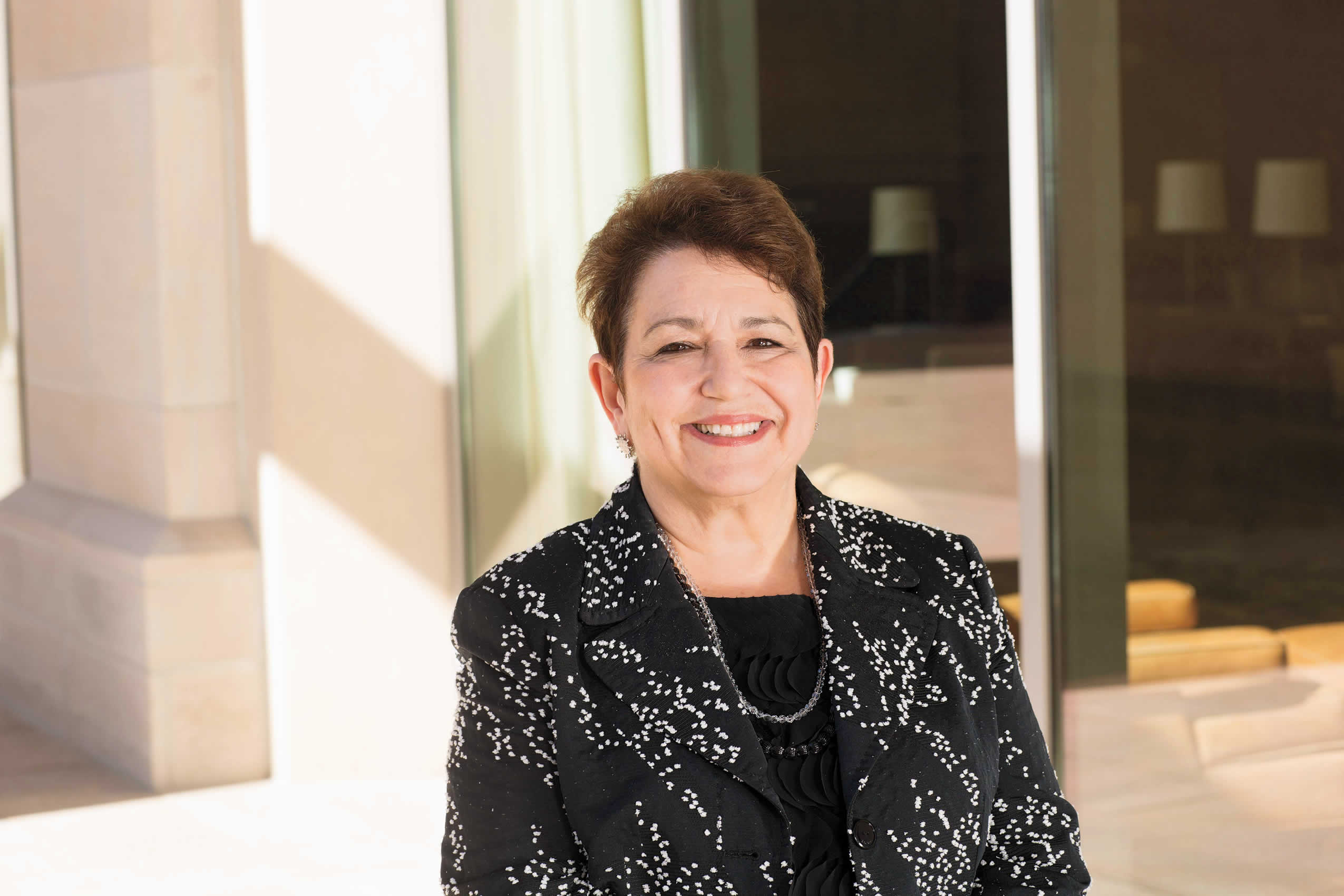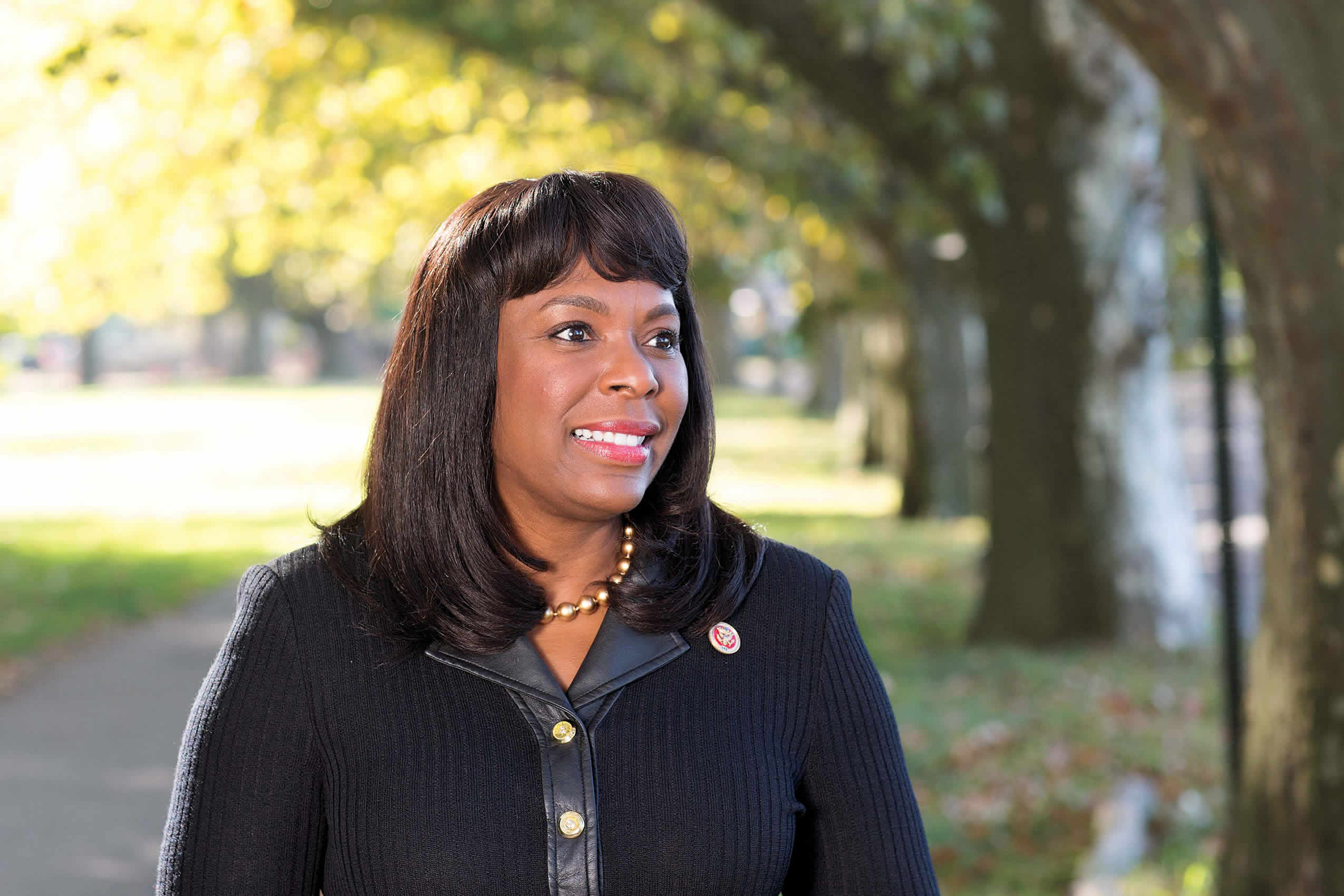This fall, more than 600 alumnae from around the country and the world came back to Harvard Law School for “Celebration 60: Leaders for Change—Women Transforming our Communities and the World.”
Among the participants were a writer who has explored the untapped power of introverts to transform leadership; the managing partner of a Taiwanese law firm; the U.S. representative for the 7th District of Alabama; and a former head of the Securities and Exchange Commission. We caught up with these four alumnae and share their reflections on women in the law and the culture, and their own experiences effecting change and progress.
Elisse Walter ’74

A former commissioner and most recently chair of the Securities and Exchange Commission, where she first worked in 1977, Elisse Walter ’74 was in public service for much of her career. She retired in August.
When she attended HLS: “I don’t think people were particularly open to women. It was not overt. It was really more under wraps by that point. But I didn’t know a single woman in my class who liked it when she was here. And now it has a completely different feel to it.”
“One thing that’s sort of heady about being a commissioner, being the head of an agency: You actually get to say, ‘I think … ’”
“I know this sounds trite or hokey, but there’s the sense of getting up in the morning and putting on your white hat and going off to do good.”
When she started at the SEC: “I had very supportive people who helped me along the way, most of them male, and never really had an issue with equal pay, lack of promotion opportunity. But I think I was one of the very lucky ones.”
“There was a senior woman at the commission who told me she always made it a point when she took her child to the doctor to get up out of a meeting and say, ‘I have to go. I have a conflict.’ So I took on as my role to take that one step further. I got up and said, ‘I’m sorry. I have to take my child to the doctor.’”
On her leadership style: “I’m a great believer in collaboration and group decision-making. I think it’s very important to consult, to give everyone a chance to air their ideas, and I think you come up with better answers.”
“It’s always easier to be the second than the first.”
“There was a survey done, which I find unbelievable, that most women prefer to work with men. I’ve worked for women and for men. I think I work with both equally well. But I love working with women.”
“I am a great believer in diversity in the boardroom. I’m not a great believer in setting quotas that must be met.”
She is married to Ronald Stern ’74, whom she met at HLS: “I remember when we decided to get married, and I said I didn’t think I was going to change my name. He looked at me and he said, ‘Why would you?’”
“Later in my career, there were many women who said to me: ‘You’re my role model. You had your children while you worked full time, and we watched to see what you’d do.’ And all of a sudden that made me self-conscious because all this time I was just trying to get by and handle the stress.”
“I find life to be rather remarkable.”
Terri Sewell ’92

Elected in 2010, Terri Sewell ’92 is the first black woman to serve in Congress from the state of Alabama, where she grew up, in Selma. Prior to her election, she was a partner in the Birmingham law office of Maynard Cooper & Gale.
“People often ask me: ‘Which was the bigger obstacle, being black or being a woman?’ And I hands-down tell people it’s being a woman. Politics is often called a contact sport, and people don’t see women as being tough enough to be in that contact sport.”
Kirsten Gillibrand, now a U.S. senator, with whom she worked as a young lawyer at Davis Polk & Wardwell in New York City, asked her to run for office: “While the 18-year-old Terri Sewell always thought she would run for Congress one day, the 40-year-old Terri Sewell had a whole different goal in life. [But]when presented with the opportunity and the encouragement to run, I said, ‘Why not?’”
“I think it’s important that we encourage other women because I wouldn’t be where I am today without women who encouraged me.”
What she heard on the campaign trail: “You’re too pretty to be running for Congress. You need to be finding a husband.”
She wrote her thesis at Princeton on black women in politics: “It is eerie to read writing that I wrote as a senior in college. It was like the young Terri Sewell talking to the older Terri Sewell.”
For her thesis, she interviewed Shirley Chisholm, the first black woman elected to Congress: “It was just so inspirational. And I want to tell you that even today, when I am frustrated, which is often, when I am disillusioned, which is often, I always pass that portrait of her in the halls of the Capitol, and I have to put a pep in my step. Because this woman fought the battles—she fought the real battles. She paved the way for the journey so many of us followed.”
On working at a Wall Street firm: “You learn how to smoke cigars; you learn how to play golf; you learn how to get along.”
“My life experiences have led me to places that were not natural fits for me. What you have to do is find a way to adapt to those places and to take away from those places the experience, the expertise, the skills you need to acquire to go on to the next level.”
She and Martha Roby, a conservative Republican, were the first women elected in a regular election from Alabama: “I think what’s missing in this day and age is the relationship. I see Martha as Martha, not as Martha this Republican congresswoman, as my enemy.”
“You can’t tell me that having women in positions of power and positions of oversight, asking questions that affect their lives and the lives of their families, hasn’t made a difference.”
“All of our voices need to be heard.”
Jennifer Lin LL.M. ’82

The managing partner of Tsar & Tsai Law Firm in her native Taiwan, Jennifer Lin LL.M. ’82 practices in the areas of intellectual property, dispute resolution and commercial transactions.
Practicing in the international sphere: “You need to be sensitive and you need to be understanding and appreciate the differences of people’s expectations.”
“I think when you are dealing with American clients, they expect you to be more aggressive. If you deal with Japanese clients, they want you to be very patient.”
“The education in Taiwan was quite equal, so women could do very well in school. There was no difference between men and women. But after you graduate, society may have some difficulty for women.”
When she started practicing: “If you sat on a board, you might be the only woman there. I experienced that a lot. And now, I’m sitting on two boards, and I’m still the only woman.”
“When I joined the firm, all the partners were men. Of course, men deal with things differently, and there were some limitations on women lawyers. But today, everything has changed. Now half of the partners are women.”
“In the old days, the partners would think that if there was any business traveling, a woman was not a suitable candidate to do that. And also it was dangerous or inconvenient for a woman to travel with a man for any business matters.”
Now that she is managing partner: “I stick to my principles. I wanted to make the firm truly gender-equal and provide a very friendly work environment for women.”
“In the States, it’s very difficult for a woman to become an equity partner or managing partner. That’s what I learned from peer groups. In Taiwan? It’s less difficult.”
“I still have a very good relationship with my [adult] daughters. We have quality time together and they never feel I’m unavailable.”
On women in leadership: “Sometimes women would think that maybe if they’re too successful, it’s very difficult to find the right man. It’s not a real glass ceiling, but it’s a kind of ceiling built up for yourself, because in the society, people still think that a woman should always be married to someone who makes more money or someone who has a higher education. That’s the kind of thing to make men feel good.”
On her husband, also a lawyer: “He has seen enough capable women and is comfortable with that. So lucky me.”
“I’m trying to help other people. That’s the fun thing about being a leader.”
Susan Cain ’93

After working in a law firm and as a negotiations consultant, Susan Cain ’93 wrote the best-seller “Quiet: The Power of Introverts in a World That Can’t Stop Talking.” She is launching a Quiet Revolution organization, including a new “Quiet” TV show. One of her first guests: self-described introvert HLS Dean Martha Minow.
“The most common thing I hear [from introverts] is: ‘I thought I was the only one who felt this way.’ That drives me crazy when I think about it, that one-third to one-half feels this way, and they all feel like they’re the lone freakish person.”
“I believe introverts more or less are today where women were at the time Betty Friedan published ‘The Feminine Mystique.’ That book kicked off consciousness-raising. And I think the same thing is happening with introverts.”
“It’s possible to adore extroverts but dislike a system where there’s a bias against introverts.”
“When I was writing ‘Quiet,’ I was very aware that I was making a countercultural and counterintuitive argument. And the legal training gave me the sustenance I needed to do years of research to back up my argument.”
“When I was at my law firm, I found that all differences in style were attributed to gender, when in fact they often had nothing to do with gender. I would see women who had no qualms, the way I did, about speaking up and taking charge. And I would see men who were much more the way I was. I started to realize that these really were questions of personality style and not of gender, and we needed another lens through which to look at things.”
“Women in the professional sphere are constantly having to juggle social expectations of being not too timid on the one hand and not too aggressive on the other hand. And there’s a very narrow channel that is permissible for women to surf.”
“I’m out on the lecture circuit now, lecturing around the world. And you go to these conferences and start to meet the other speakers on the circuit, and they’re almost always men. You talk to the conference organizers and they say: ‘We want more women and can’t find them. When we ask women to speak, they hem and haw and usually decline. They say they’re too busy or not enough of an authority on this topic.’”
“I think it’s worth pushing yourself through your comfort zone only in the service of something you really, truly care about.”
“If you were a manager or CEO and you started to understand that half of your workforce is not as happy and energized as they could be and there are sometimes very slight changes you could make to alter that scenario, wouldn’t you want to do it?”